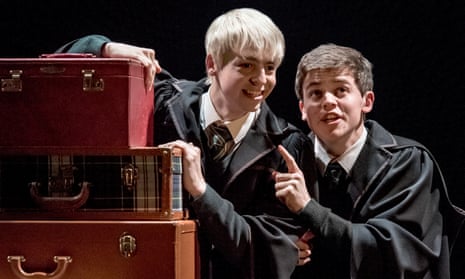Last week’s release of Harry Potter and the Cursed Child, the script of the new story from JK Rowling’s beloved wizard, caused the expected stir – but for reasons unanticipated. As the text landed in bookshops around the world, accusations began flying as readers debated whether the two young characters – Scorpius Malfoy and Albus Potter – were an example of “queerbaiting”.
Queerbaiting is a term that exists mostly in fan communities, and refers to the writers or creators of a world (whether of a movie franchise, a book series, or a TV show) using injections of homoeroticism and romance to draw an audience seeking LGBTQ representation, while not alienating a wider audience who may not want to see a gay relationship depicted. Think of the term “bromance” – a dynamic that employs romantic tropes, all the while not actually fulfilling them.
Accusations of queerbaiting are more commonly directed towards television than books: TV shows such as House, Supernatural and Rizzoli & Isles have all been singled out, while recent depictions of “confirmed bachelors” Sherlock Holmes and John Watson have also been accused of dabbling in manipulative homoeroticism.
In the case of Harry Potter and the Possible Example of Queerbaiting, the accusation stems from the play’s portrayal of male friendship. Albus and Scorpius become very close friends from the beginning of their first year at Hogwarts. Both shy and shunned and neither much like their famous fathers, their friendship becomes critical. Albus and Scorpius make a fuss out of hugging (“We said we wouldn’t do that!”) in a manner resembling the common trope “Hot Gay Hugging”: a hilarious title for the less-than-funny absence of casual intimacy allowed between homosexual characters. Hetero couples get to kiss, the gays are limited to a (hot gay) hug. And Albus and Scorpius do go for it, with all the awkwardness you’d expect from two English lads.
To be fair to the fans, Albus and Scorpius’s friendship in this story does seem to have a different inflection this time: they are intensely codependent and their intimacy is at one point compared to the doomed romance between Severus Snape and Lily Potter. When it was published, the script sent fans into a frenzy of discussion online. Believers have affectionately (or defiantly?) dubbed the couple “Scorbus”, while a piece on Tor.com was rather more cautious: “I’m all for depictions of strong friendships that define people, but Albus and Scorpius don’t read like Harry and Ron,” wrote Emily Asher-Perrin. Daily Dot writer Gavia Baker-Whitelaw, rather more bluntly, tweeted an alternative title:
Harry Potter and the Curse of Heteronomativity
— Gavia Baker-Whitelaw (@Hello_Tailor) August 1, 2016
As someone who is not part of fan fiction communities myself, it is a little hard to find a way into this argument. But speaking to some in fandom, it seems people are holding Rowling personally accountable for the lack of romance because she has engaged with fan theories in the past. She has even retrospectively confirmed some – including Harry’s son Albus being sorted into Slytherin, and his becoming friends with Scorpius. Since Rowling outed Albus Dumbledore as a gay man – retrospectively, once the books were finished and the character dead – readers have been impatient to see a gay character introduced in Harry Potter’s world.
Some Scorbus got in well ahead of the Cursed Child: there is a cornucopia of Scorbus fan fiction online, with some stories dating back to years before the play was even announced. Because of this, some commentators are suspicious that the appetite for a Scorbus romance was not unknown to those catering to it.
“The writers of the Cursed Child intentionally included this fan theory to draw us in, but decided to change it just enough so that they wouldn’t have to admit that they made two 11-year-olds gay,” Jameson Ortiz, an LGBTQ campaigner and Harry Potter fan, told me. “It’s queerbaiting because they knew exactly who they were reeling in and why, but still decided to leave out the main attraction for all the fans they hooked, choosing instead, like so many others, to set up the gay romance, hint at it constantly, make it believable and deep and perfect, and then force it out of the story.”
Put aside sexuality for just one moment – regardless of whether you are gay or not, it is extremely important to see portrayals of deep, emotional, non-sexual romantic male friendships in popular culture. Currently, there are very few on offer. Toxic masculinity, a social condition that dictates men must act a certain way in order to be acceptably manly, has damaged portrayals of male friendships on TV, in our films, on the page. Pop culture too often settles for stereotypes: men talk about sports, boast about sex, and don’t touch one another. Any emotional or physical closeness is brushed away as “gay” in a pejorative sense. Because of what we see, its no wonder there is a sense of insecurity and shame about physical intimacy of any sort between men – sexual or not. The lack of representation of even casual intimacy between men may be one of the reasons fans so desperately wish these male characters into romantic relationships – leading to accusations of queerbaiting when they don’t see their fantasy officially told. This isn’t to say that queerbaiting isn’t real – but there’s a reason why we see closeness between men as almost intrinsically gay. And that is a problem in itself.
So while The Cursed Child is criticised for queerbaiting, it should be celebrated for what it does do on the page: portray a loving relationship between two boys, who may or may not be in love. Because that achievement, while maybe not as progressive as some may want, is still progress.

Comments (…)
Sign in or create your Guardian account to join the discussion